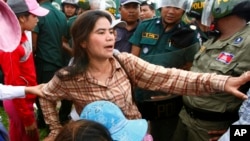The World Bank’s decision this month to resume lending to Cambodia after a five-year moratorium has drawn criticism from development experts.
The global development bank's May 19 announcement that it would issue $130 million in new loans to the Southeast Asian nation to fund poverty reduction projects caught some critics of the Phnom Penh government by surprise.
The bank placed a freeze on new loans in August 2011 after coming under fire for its support for a land titling scheme for victims of forced eviction from Boeung Kak Lake.
Phil Robertson, deputy director of Human Rights Watch’s Asia division, said the bank’s decision to go ahead with planned loans would be interpreted as a “green light” by the government to continue its crackdown on dissent.
“The unfortunate reality is that obviously the World Bank is politically tone deaf when it comes to dealing with human rights,” he said.
“You know that is an unfortunate stance," he added. "I mean, none of the corruption has been handled in Cambodia; none of the human rights issues have been handled. The problems with land and the seizures of land by cronies connected to the government have not been solved.”
'Squandering its credibility'
David Pred, managing director of NGO Inclusive Development International, said bank officials took a “rare stand for human rights and accountability when [they] suspended new loans to Cambodia pending a satisfactory remedy for the Boeung Kak Lake residents.”
“By renewing lending now, without first ensuring assistance is provided to the thousands of people who were forcibly evicted and impoverished, the bank is squandering its credibility,” Pred added.
The government has often described critics of foreign investment in the country as being anti-development, a characterization Pred called inaccurate.
“I don't know anyone who wants to block the development of Cambodia," he said. "Those who are protesting this decision simply want to see a different development model — one which places the rights and well-being of people above the interests of the ruling elite and foreign investors.”
New loans include funding for a controversial land concession project that could see villagers in Kampong Thom province forcibly relocated.
Chheang Vannarith, head of the Cambodian Institute for Strategic Studies, said the bank is seeking to keep its relevance in the region amid the increasing clout of the China-led Asian Infrastructure Investment Bank.
“I think that the World Bank has bent along with a political and economic strategy in the region," he said. "I see that the World Bank does not want to lose its role in Southeast Asia, especially Cambodia.”
This report was produced in collaboration with VOA's Khmer service.




